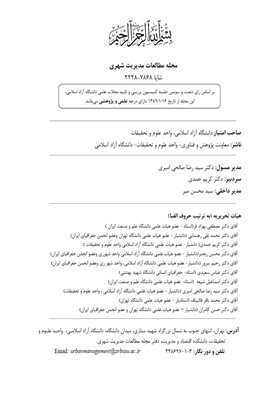بررسی راهکارهای تحقق مدیریت یکپارچه شهری در شهر تهران
محورهای موضوعی : مطالعات مدیریت شهری
سید پویا میر مسعودی
1
![]() ,
رضا منصوری ارمکی
2
,
رضا منصوری ارمکی
2
1 - کارشناسی ارشد مدیریت شهریpmirmasoudi.talesh@gmail.com
2 - کارشناسی ارشد مدیریت شهریreza.mansouri.2020@gmail.com
کلید واژه: مدیریت یکپارچه شهری, آموزش, شهرداری تهران,
چکیده مقاله :
مقدمه و هدف پژوهش: برای اداره موفق کلان شهر نمیتوان از مدیریتهای جداگانه و هدایتگرهای بخشی بهره گرفت. اگر هر یک از عناصر مجموعه مدیریت شهر بنا به حوزه اختیارات خود برای شهر تصمیم بگیرند و از منظر خرد و بخشینگری به شهر بنگرند، ناهماهنگی تصمیمات در بعد کلان مشکلات عدیدهای را پیش خواهد آورد که میتواند بخشی از مسائل کنونی را حاصل این تفرق و عدم یکپارچگی مدیریت شهر دانست. تحقیق حاضر به منظور بررسی راهکارهای تحقق مدیریت یکپارچه شهری در شهرداری تهران انجام گرفته است. روش پژوهش: این پژوهش براساس هدف کاربردی و بر اساس روش توصیفی- پیمایشی بوده است. جامعه آماری شامل افراد کارکنان شهرداری میباشد و دادهها با استفاده از توزیع و جمعآوری 932 پرسشنامه در نمونهای که به روش طبقهای از جامعه انتخاب گردید گردآوری و با استفاده از نرم افزار Spss مورد تجزیه و تحلیل قرار گرفتند یافتهها: در نمونه 195 نفری مورد مطالعه، دانش و اطلاعات و آموزش و پرورش و مشارکت مردمی و شهروندان و مدیریت عمومی محیطی در تحقق مدیریت یکپارچه شهری در شهرداری شهرری اثر گذار است. نگرش به راهکارهای تحقق مدیریت یکپارچه شهری در بین پاسخگویان مرد و زن، مجرد و متأهل، بین سطوح مختلف تحصیلات و بین سنین مختلف یکسان است وضعیت و جنسیت تأهل تاثیری بر آن ندارد. نتیجه گیری: نتایج این تحقیق نشان داد که شهر تهران تا رسیدن به شاخصهای مدیریت یکپارچه شهری فاصله زیادی را باید طی کند و پیمودن آن نیازمند هماهنگی بین تمام سازمانهای دخیل در مدیریت یکپارچه شهری است.
Introduction & Objective: For the successful management of the metropolitan area, you cannot use separate management and part-based guides. If any of the elements of city management, according to their area of authority for the city, will look at the city from a small perspective. The inconsistency of decisions in the large dimension will cause many problems that could be part of the current issues as a result of this disparity and the lack of integration of city management. This research has been carried out to investigate the solutions for implementing integrated urban management in Tehran municipality. Methodology: This research was based on the applied objective and based on descriptive-survey method. The statistical population consisted of the employees of the municipality staff and the data were collected by 932 questionnaires in a stratified sampling from the community and analyzed using SPSS software. Results: Knowledge and information, education and popular participation and citizens and public environmental management were effective in the implementation of integrated urban management in the municipality of Ray Town. Attitudes toward the implementation of integrated urban management solutions among male and female respondents, single and married, different levels of education and between different ages are the same and the situation as well as marital sex do not affect it. Conclusion: The results of this study showed that Tehran has to go a long way in reaching the integrated urban management indicators, and it requires coordination between all organizations involved in integrated urban management.
احمدی and عمرانی (2015). "ارزیابی تاثیرات هوشمندسازی شهر با تاکید بر مولفههای توسعه پایدار." فصلنامه علوم و تکنولوژی محیط زیست: 1-12.
اله, ف. ر., et al. "تحلیل تقسیمات کالبدی شهری بر اساس مدیریت یکپارچه نمونه موردی شهر شیراز."
جواد, م., et al. "مدل یکپارچه برنامه ریزی استراتژیک شهرها و شهرداریهای ایران (با تاکید بر شهر و شهرداری تهران)."
رضایی, ع. ا., 2015). "نقش مدیریت شهری در ارتقاء شاخصهای خوشبختی شهروندان (مطالعه موردی شهروندان ساکن در ناحیه 3 منطقه 5 شهرداری تهران)." مطالعات مدیریت شهری 6(18): 108-125.
رمضانی فرخد, ا. (1393). مطالعه مروری مقالات مدیریت یکپارچه شهری. ششمین کنفرانس ملی برنامهریزی و مدیریت شهری با تأکید بر مؤلفههای شهر اسلامی, شورای اسلامی شهر مشهد.
شماعی and ابراری (2013). "نقش مدیریت یکپارچه شهری در توسعه فرهنگ شهرنشینی شهر تهران." فصلنامه علمی-پژوهشی اطلاعات جغرافیایی «سپهر» 22(86): 67-73.
مبرقعی, ن. (1389). لزوم تحقق مدیریت یکپارچه محیط زیست شهری. نخستین همایش توسعه شهری پایدار, قطب علمی توسعه شهری پایدار.
محمدمهدی, ع., et al. "نقش قوانین و مقررات در تحقق مدیریت یکپارچه در مجموعه شهری تهران."
نظریان (2012). "تحلیل الگوی مدیریتی شهر تهران." پژوهشهای جغرافیای انسانی 44(3): 111-126.
Baird, R. C. "On a Strategic Framework for Performance Enhancement in Managing New Jersey’s Urban Coast."
Chakrabarty, B. K. (2001). "Urban management: Concepts, principles, techniques and education." Cities 18(5): 331-345.
Cheema, G. S. and S. E. Ward (1993). Urban management: Policies and innovations in developing countries, Praeger Publishers.
Cohen, B. (2006). "Urbanization in developing countries: Current trends, future projections, and key challenges for sustainability." Technology in society 28(1-2): 63-80.
James, P., et al. (2009). "Towards an integrated understanding of green space in the European built environment." Urban Forestry & Urban Greening 8(2): 65-75.
Menegat, R. (2002). "Participatory democracy and sustainable development: integrated urban environmental management in Porto Alegre, Brazil." Environment and Urbanization 14(2): 181-206.
Rydén, L. (2008). Tools for integrated sustainability management in cities and towns, Uppsala Centre for Sustainable Development, Uppsala University.
Schwedler, H.-U. (2011). Integrated Urban Governance: The Way Forward, Senate Department for Urban Development.
_||_

